| Listing 1 - 10 of 14 | << page >> |
Sort by
|
Book
ISBN: 1467385581 1467385573 9781467385572 Year: 2015 Publisher: Piscataway, New Jersey : Institute of Electrical and Electronics Engineers (IEEE),
Abstract | Keywords | Export | Availability | Bookmark
 Loading...
Loading...Choose an application
- Reference Manager
- EndNote
- RefWorks (Direct export to RefWorks)
For Reliability, Maintainability, Supportability, Testability, Safety (RMTSS) Modeling, Simulation and Optimization Design, Analysis, Evaluation Standards Information Technologies Human Factors Engineering Systems Engineering Product Warranty and Quality Engineering etc.
Computer systems --- Computer systems Reliability --- Evaluation
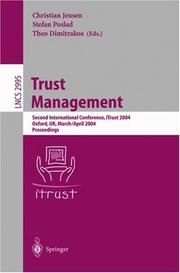
ISBN: 9783540213123 3540213120 Year: 2004 Publisher: Berlin: Springer,
Abstract | Keywords | Export | Availability | Bookmark
 Loading...
Loading...Choose an application
- Reference Manager
- EndNote
- RefWorks (Direct export to RefWorks)
Computer systems - Reliability - Congresses --- Trust - Congresses --- Computer systems --- Trust
Periodical
ISSN: 15455971 Year: 2011 Publisher: New York, N.Y.: IEEE Computer society,
Abstract | Keywords | Export | Availability | Bookmark
 Loading...
Loading...Choose an application
- Reference Manager
- EndNote
- RefWorks (Direct export to RefWorks)
computerkunde --- Computer. Automation --- Electrical engineering --- beveiliging (elektrotechniek) --- Fault-tolerant computing --- Computer systems --- Computer security --- Computer security. --- Fault-tolerant computing. --- Reliability --- Reliability. --- Information Technology --- Computer Security Confidentiality --- Mathematical Sciences --- Applied Mathematics --- Periodicals --- Information Technology. --- Computer Security Confidentiality. --- Elektrotechniek --- Computer. Informatica. Automatisering --- Fault-tolerant computing - Periodicals --- Computer systems - Reliability - Periodicals --- Computer security - Periodicals
Book
ISBN: 3834812870 9786613172488 3834897078 1283172488 Year: 2010 Publisher: Wiesbaden : Vieweg+Teubner Research : Springer Fachmedien Weisbaden GmbH,
Abstract | Keywords | Export | Availability | Bookmark
 Loading...
Loading...Choose an application
- Reference Manager
- EndNote
- RefWorks (Direct export to RefWorks)
Given that faults cannot be prevented in sufficiently complex systems, means of fault tolerance are essential for dependable distributed systems. Designing and evaluating fault-tolerant systems require well-conceived fault models. In the past, theoretical works have used simplified models that, while being tractable, turned out to be inaccurate. Practical works have used probabilistic fault models that, while being more accurate, often turned out to be intractable. Timo Warns bridges the gap between theory and practice regarding fault models. He has developed tractable fault models that, while being non-probabilistic, are accurate for dependent and propagating faults. Using seminal problems such as consensus and constructing coteries, he demonstrates how the new models can be used to design and evaluate effective and efficient means of fault tolerance.
Information Technology --- Computer Science (Hardware & Networks) --- Computer systems -- Reliability. --- Electronic data processing. --- Fault-tolerant computing. --- Engineering & Applied Sciences --- Computer Science --- Computing, Fault-tolerant --- Computer science. --- Computer communication systems. --- Software engineering. --- Computer Science. --- Computer Communication Networks. --- Software Engineering/Programming and Operating Systems. --- Computer Science, general. --- Electronic data processing --- Electronic digital computers --- Fault tolerance (Engineering) --- Computer system failures --- Reliability --- Informatics --- Science --- Computer software engineering --- Engineering --- Communication systems, Computer --- Computer communication systems --- Data networks, Computer --- ECNs (Electronic communication networks) --- Electronic communication networks --- Networks, Computer --- Teleprocessing networks --- Data transmission systems --- Digital communications --- Electronic systems --- Information networks --- Telecommunication --- Cyberinfrastructure --- Network computers --- Distributed processing
Book
ISBN: 1281861685 9786611861681 1848003722 1848003714 1849967946 9781848003712 Year: 2008 Volume: 1614-7839 Publisher: New York, N.Y.: Springer,
Abstract | Keywords | Export | Availability | Bookmark
 Loading...
Loading...Choose an application
- Reference Manager
- EndNote
- RefWorks (Direct export to RefWorks)
What evidence is sufficient to justify the release of a computer-based safety critical system? How should this evidence be presented to certification bodies or regulatory authorities? What best practices should be applied? These are just a few of the questions addressed by Justifying the Dependability of Computer-based Systems, which provides a framework for the justification of the dependability of a computer-based system. The book also explores some of the more fundamental aspects of safety evaluation, such as the nature of models, arguments, evidence and documentation, and the ways to deal with different types of risk and uncertainty. Justifying the Dependability of Computer-based Systems will be of value to software, computer system, instrumentation and control engineers, and regulators working in industry sectors such as nuclear safety. Pierre-Jacques Courtois is a Professor in the Department of Computer Science and Engineering at the Catholic University of Louvain-la-Neuve, with particular research interests in safety-critical software for the nuclear industry. He has more than fifteen years experience in the nuclear safety industry, having worked as a nuclear safety advisor in Finland and the UK, and as a consultant to the International Atomic Energy Agency (IAEA) and the Organisation for Economic Co-operation and Development (OECD).
Engineering. --- Computer organization. --- Computational intelligence. --- Quality control. --- Reliability. --- Industrial safety. --- Quality Control, Reliability, Safety and Risk. --- Engineering, general. --- Computational Intelligence. --- Computer Systems Organization and Communication Networks. --- Industrial accidents --- Industries --- Job safety --- Occupational hazards, Prevention of --- Occupational health and safety --- Occupational safety and health --- Prevention of industrial accidents --- Prevention of occupational hazards --- Safety, Industrial --- Safety engineering --- Safety measures --- Safety of workers --- Accidents --- System safety --- Dependability --- Trustworthiness --- Conduct of life --- Factory management --- Industrial engineering --- Reliability (Engineering) --- Sampling (Statistics) --- Standardization --- Quality assurance --- Quality of products --- Intelligence, Computational --- Artificial intelligence --- Soft computing --- Organization, Computer --- Electronic digital computers --- Construction --- Industrial arts --- Technology --- Prevention --- Computer systems --- Nuclear engineering --- Nuclear power plants --- Safety measures. --- ADP systems (Computer systems) --- Computing systems --- Systems, Computer --- Electronic systems --- Cyberinfrastructure --- System safety. --- Computer network architectures. --- Architectures, Computer network --- Network architectures, Computer --- Computer architecture --- Safety, System --- Safety of systems --- Systems safety --- Industrial safety --- Systems engineering --- Computer systems - Reliability --- Nuclear power plants - Safety measures --- Nuclear engineering - Safety measures
Book
ISBN: 9780387736549 0387736549 0387736557 Year: 2007 Publisher: New York : Springer,
Abstract | Keywords | Export | Availability | Bookmark
 Loading...
Loading...Choose an application
- Reference Manager
- EndNote
- RefWorks (Direct export to RefWorks)
International Federation for Information Processing The IFIP series publishes state-of-the-art results in the sciences and technologies of information and communication. The scope of the series includes: foundations of computer science; software theory and practice; education; computer applications in technology; communication systems; systems modeling and optimization; information systems; computers and society; computer systems technology; security and protection in information processing systems; artificial intelligence; and human-computer interaction. Proceedings and post-proceedings of referred international conferences in computer science and interdisciplinary fields are featured. These results often precede journal publication and represent the most current research. The principal aim of the IFIP series is to encourage education and the dissemination and exchange of information about all aspects of computing. For more information about the 300 other books in the IFIP series, please visit www.springer.com. For more information about IFIP, please visit www.ifip.org.
Computer systems --- Trust --- Computers --- Computer security --- Electronic commerce --- Systèmes informatiques --- Confiance --- Ordinateurs --- Sécurité informatique --- Commerce électronique --- Reliability --- Congresses --- Access control --- Security measures --- Fiabilité --- Congrès --- Accès --- Contrôle --- Sécurité --- Mesures --- Computer security -- Congresses. --- Computer systems -- Reliability -- Congresses. --- Computers -- Access control -- Congresses. --- Electronic books. -- local. --- Electronic commerce -- Security measures -- Congresses. --- Trust -- Congresses. --- Computer Science --- Engineering & Applied Sciences --- Cybercommerce --- E-business --- E-commerce --- E-tailing --- eBusiness --- eCommerce --- Electronic business --- Internet commerce --- Internet retailing --- Online commerce --- Web retailing --- Trust (Psychology) --- Computer science. --- Computer security. --- Computer Science. --- Systems and Data Security. --- Computer privacy --- Computer system security --- Cyber security --- Cybersecurity --- Electronic digital computers --- Protection of computer systems --- Security of computer systems --- Data protection --- Security systems --- Hacking --- Informatics --- Science --- Protection --- Commerce --- Information superhighway --- Attitude (Psychology) --- Emotions
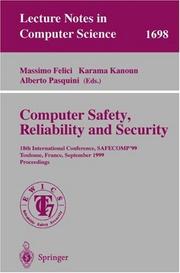
ISBN: 3540664882 9783540664888 3540482490 Year: 1999 Volume: 1698 Publisher: Berlin: Springer,
Abstract | Keywords | Export | Availability | Bookmark
 Loading...
Loading...Choose an application
- Reference Manager
- EndNote
- RefWorks (Direct export to RefWorks)
The European Commission emphasizes, in its Fifth Research Framework, the “. . . emerging generic dependability requirements in the information society, stemming both from the ubiquity and volume of embedded and networked systems and services as well as from the global and complex nature of large scale information and communication infrastructures, from citizens, administrations and business in terms of technologies, tools, systems, applications and services". The series of Conference on Computer Safety, Reliability, and Security (Safecomp) contributes to satisfy these requirements by reviewing the state of the art, experiences, and new trends in the relevant scientific and industrial areas. Safecomp is intended to be a platform for technology transfer among academia, industry, and research institutions, providing the opportunity for exchange of ideas, opinions, and visions among experts. This year Safecomp celebrates the 20th anniversary, its first Conference having been organized in Stuttgart by EWICS (European Workshop on Industrial Computer Systems) in 1979, and we hope these Proceedings will contribute to the celebration by supporting Safecomp aims. The Proceedings include the 25 papers that have been presented orally at the Conference and the full version of the 14 papers that have been presented as posters, all of which were selected from 76 submissions. Papers almost uniformly take up Safecomp topics, dealing with the issues of Safety Assessment and Human Factors, Verification and Validation, Design for Safety, Formal Methods, and Security.
Computer systems --- Computer security --- Reliability --- Computer Science --- Engineering & Applied Sciences --- Computer science. --- Special purpose computers. --- Software engineering. --- Operating systems (Computers). --- Computer logic. --- Management information systems. --- Computer Science. --- Software Engineering/Programming and Operating Systems. --- Operating Systems. --- Logics and Meanings of Programs. --- Special Purpose and Application-Based Systems. --- Management of Computing and Information Systems. --- Logic design. --- Information Systems. --- Design, Logic --- Design of logic systems --- Digital electronics --- Electronic circuit design --- Logic circuits --- Machine theory --- Switching theory --- Computer operating systems --- Computers --- Disk operating systems --- Systems software --- Computer software engineering --- Engineering --- Operating systems --- Informatics --- Science --- Computer-based information systems --- EIS (Information systems) --- Executive information systems --- MIS (Information systems) --- Sociotechnical systems --- Information resources management --- Management --- Special purpose computers --- Computer science logic --- Logic, Symbolic and mathematical --- Communication systems --- Computer systems - Reliability - Congresses --- Computer security - Congresses
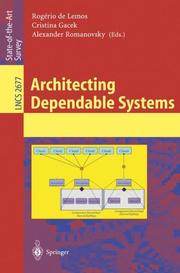
ISBN: 3540407278 3540451773 Year: 2003 Publisher: Berlin, Germany ; New York, United States : Springer,
Abstract | Keywords | Export | Availability | Bookmark
 Loading...
Loading...Choose an application
- Reference Manager
- EndNote
- RefWorks (Direct export to RefWorks)
As software systems become more and more ubiquitous, the issues of dependability become more and more critical. Given that solutions to these issues must be planned at the beginning of the design process, it is appropriate that these issues be addressed at the architectural level. This book is inspired by the ICSE 2002 Workshop on Architecting Dependable Systems; it is devoted to current topics relevant for improving the state of the art for architecting dependability. Some of the 13 peer-reviewed papers presented were initially presented at the workshop, others were invited in order to achieve competent and complete coverage of all relevant aspects. The papers are organized in topical sections on - architectures for dependability - fault tolerance in software architectures - dependability analysis in software architectures - industrial experience.
Computer architecture. --- Computer systems -- Reliability. --- Fault-tolerant computing. --- Computer architecture --- Computer systems --- Fault-tolerant computing --- Computer Science --- Engineering & Applied Sciences --- Reliability --- Reliability. --- Computing, Fault-tolerant --- ADP systems (Computer systems) --- Computing systems --- Architecture, Computer --- Systems, Computer --- Computer science. --- Software engineering. --- Operating systems (Computers). --- Computers. --- Computer Science. --- Theory of Computation. --- Software Engineering. --- Computer Science, general. --- Operating Systems. --- Automatic computers --- Automatic data processors --- Computer hardware --- Computing machines (Computers) --- Electronic brains --- Electronic calculating-machines --- Electronic computers --- Hardware, Computer --- Cybernetics --- Machine theory --- Calculators --- Cyberspace --- Computer operating systems --- Computers --- Disk operating systems --- Systems software --- Computer software engineering --- Engineering --- Informatics --- Science --- Operating systems --- Electronic systems --- Cyberinfrastructure --- Electronic data processing --- Electronic digital computers --- Fault tolerance (Engineering) --- Computer system failures --- Information theory. --- Communication theory --- Communication
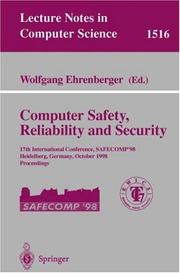
ISSN: 03029743 ISBN: 3540651101 9783540651109 3540496467 Year: 1998 Volume: 1516 Publisher: Berlin: Springer,
Abstract | Keywords | Export | Availability | Bookmark
 Loading...
Loading...Choose an application
- Reference Manager
- EndNote
- RefWorks (Direct export to RefWorks)
Computers and their interactions are becoming the characteristic features of our time: Many people believe that the industrial age is going over into the information age. In the same way as life of the beginning of this century was dominated by machines, factories, streets and railways, the starting century will be characterised by computers and their networks. This change naturally affects also the institutions and the installations our lives depend upon: power plants, including nuclear ones, chemical plants, mechanically working factories, cars, railways and medical equipment; they all depend on computers and their connections. In some cases it is not human life that may be endangered by computer failure, but large investments; e. g. if a whole plant interrupts its production for a long time. In addition to loss of life and property one must not neglect public opinion, which is very critical in many countries against major technical defects. The related computer technology, its hardware, software and production process differ between standard applications and safety related ones: In the safety case it is normally not only the manufacturers and the customers that are involved, but a third party, usually an assessor, who is taking care of the public interest on behalf of a state authority. Usually safety engineers are in a better position than their colleagues from the conventional side, as they may spend more time and money on a particular task and use better equipment.
Computer systems --- Computer security --- Reliability --- Computer science. --- Special purpose computers. --- Software engineering. --- Data encryption (Computer science). --- Coding theory. --- Computer logic. --- Computers and civilization. --- Computer Science. --- Data Encryption. --- Computers and Society. --- Software Engineering/Programming and Operating Systems. --- Coding and Information Theory. --- Logics and Meanings of Programs. --- Special Purpose and Application-Based Systems. --- Congresses --- Logic design. --- Cryptology. --- Design, Logic --- Design of logic systems --- Digital electronics --- Electronic circuit design --- Logic circuits --- Machine theory --- Switching theory --- Data compression (Telecommunication) --- Information theory --- Signal theory (Telecommunication) --- Computer programming --- Computer software engineering --- Engineering --- Informatics --- Science --- Data encoding (Computer science) --- Encryption of data (Computer science) --- Cryptography --- Information theory. --- Special purpose computers --- Computers --- Computer science logic --- Logic, Symbolic and mathematical --- Communication theory --- Communication --- Cybernetics --- Civilization and computers --- Civilization --- Computer systems - Reliability - Congresses --- Computer security - Congresses
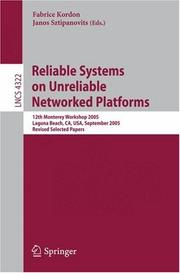
ISBN: 9783540711551 3540711554 9786610935789 1280935782 3540711562 Year: 2007 Publisher: Berlin, Heidelberg : Springer Berlin Heidelberg : Imprint: Springer,
Abstract | Keywords | Export | Availability | Bookmark
 Loading...
Loading...Choose an application
- Reference Manager
- EndNote
- RefWorks (Direct export to RefWorks)
Computer software --- Software architecture --- Computer systems --- Logiciels --- Systèmes informatiques --- Development --- Congresses. --- Reliability --- Développement --- Congrès --- Fiabilité --- Computer software -- Development -- Congresses. --- Computer systems -- Reliability -- Congresses. --- Electronic books. -- local. --- Software architecture -- Development -- Congresses. --- Computer Science --- Engineering & Applied Sciences --- Information Technology --- Software Engineering --- Architecture, Software --- Computer software architecture --- Architecture --- Design --- Computer science. --- Computer communication systems. --- Software engineering. --- Computer programming. --- Programming languages (Electronic computers). --- Computer logic. --- Computer Science. --- Software Engineering/Programming and Operating Systems. --- Software Engineering. --- Programming Techniques. --- Programming Languages, Compilers, Interpreters. --- Logics and Meanings of Programs. --- Computer Communication Networks. --- Computer science logic --- Logic, Symbolic and mathematical --- Computer languages --- Computer program languages --- Computer programming languages --- Machine language --- Electronic data processing --- Languages, Artificial --- Computers --- Electronic computer programming --- Electronic digital computers --- Programming (Electronic computers) --- Coding theory --- Computer software engineering --- Engineering --- Communication systems, Computer --- Computer communication systems --- Data networks, Computer --- ECNs (Electronic communication networks) --- Electronic communication networks --- Networks, Computer --- Teleprocessing networks --- Data transmission systems --- Digital communications --- Electronic systems --- Information networks --- Telecommunication --- Cyberinfrastructure --- Network computers --- Informatics --- Science --- Programming --- Distributed processing --- Logic design. --- Design, Logic --- Design of logic systems --- Digital electronics --- Electronic circuit design --- Logic circuits --- Machine theory --- Switching theory --- Programming languages (Electronic computers) --- Computer networks.
| Listing 1 - 10 of 14 | << page >> |
Sort by
|

 Search
Search Feedback
Feedback About UniCat
About UniCat  Help
Help News
News